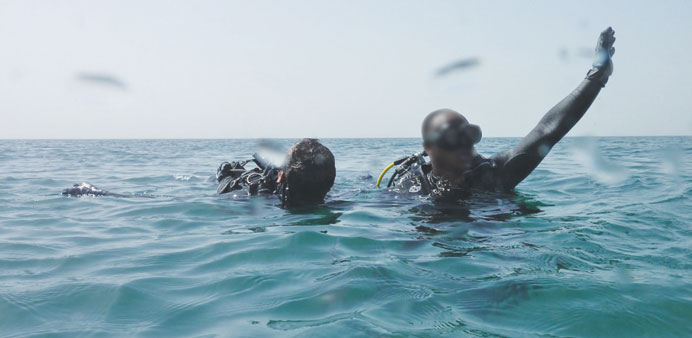By Bonnie James/Deputy News Editor
|
|
There is an urgent need to ensure all necessary safety measures are adopted by those engaging in recreational diving in Qatar, a professional marine consultant and master instructor has urged.
“Many professional divers have had to rescue improperly trained diving enthusiasts at some of the most popular locations of late,” Khaled Zaki told Gulf Times yesterday.
An expert who has certified more than 1,000 divers in the country over the past 13 years, he recalled witnessing “incidents” and near accidents at the Mesaieed beach at an alarming frequency over the past few months.
An “incident” according to the divers’ lexicon “is any unexpected, potentially hazardous occurrence - such as panic, exhaustion or an out-of-air emergency - that results in no injury”, whereas an accident causes “any injury which requires treatment in a hospital emergency room”.
If practised properly, recreational diving has very few potential hazards, compared to other adventure sports such as mountain climbing, surfing or skiing or even football.
“Diving training centres should display prominently the course standards and requirements and some of the new freelance instructors need to think more about safety and quality,” observed Zaki, a professional instructor affiliated to many diving federations for nearly two decades.
Anyone wishing to learn diving should follow the course structure and prerequisites, such as completing a medical questionnaire, liability release and receive materials including books, instructional DVD and Recreational Dive Planner or register online for the manual, DVD and quizzes.
The course, for a minimum of three days, is three parts – theory lessons in classroom, swimming pool dives and open water dives in the sea.
“Recently, we witnessed an incident in which a student diver got separated from his group, panicked and shot to the surface and was out of air to inflate his jacket in order to float, only because he was left behind unattended in the open sea,” Zaki recalled.
Dive instructors should focus only on their group and not have any diversions in the form of a spear gun or underwater camera, he suggested.
The trainees should ensure that they do at least a few pool dives and practice all the skills featured in the DVD. They need to complete at least four open water dives on two different days using one air tank for each dive.
The students should log all activities and dives and get it signed by the same instructor who taught, unless there is a referral document from another instructor.
Instructors should stick to the relevant course standards, terms and code of conduct and make proper documentation.
They should ensure that the student divers do a 200m swimming test in a pool in order to ascertain their abilities before taking them for open water dives.
A poor judgment in evaluating the swimming ability and diving skills during training dives might lead to some problems, including drowning or near drowning, and ear-drum concerns on account of pressure difference, mainly during descent.
“Give more time so that the students master skills including buoyancy control, clearing a foggy mask, airway control and an efficient kicking cycle with fins.”
Most of the accidents happen because of poor buoyancy control which will lead to other challenges such as fast depletion of the breathing gas, overexertion and subsequent panic.
Poor training and errors by the diver also cause diving accidents.
Theory should be given importance and diving hazards highlighted. Students need to be taught how to stay safe while diving. The diving equipment should be well maintained.
Learners should be thorough with the Recreational Dive Planner which lets them know the effect of depth, time and gas they are breathing and the changes that will happen in their body.
Having a good risk assessment/management plan to keep divers by preventing accidents will play an important role in protecting instructors from legal liabilities.
“Considering that scuba diving has become a very popular sport in Qatar, it is high time that the authorities concerned ensured adoption of all the safety standards by the instructors and trainees in order to avoid incidents or accidents,” Zaki suggested.
“Though there are regulatory bodies for various sport and recreational activities in Qatar, there is none for scuba diving, despite a tremendous increase in the number of those undertaking the sport,” he pointed out.

